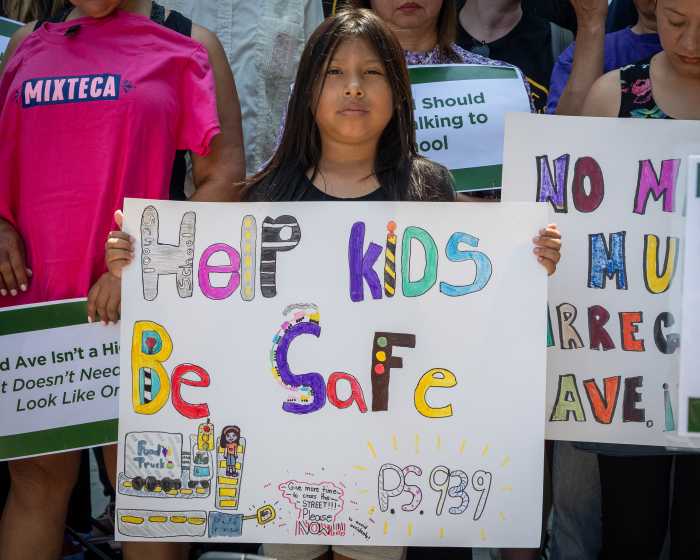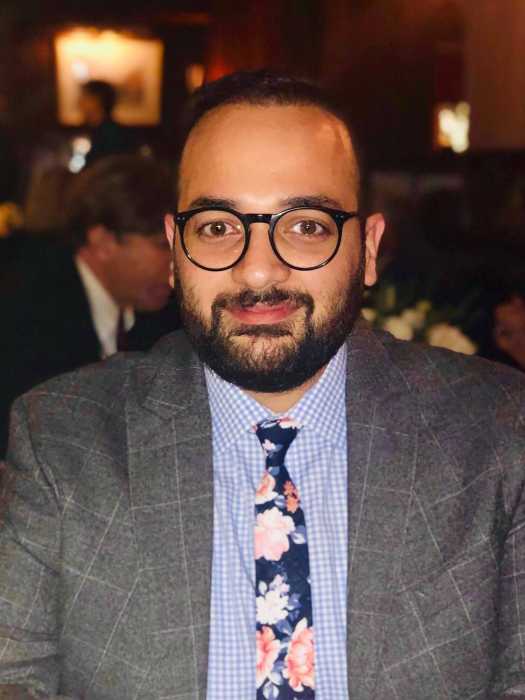Affordable housing, constituent services rise to fore in contest for Margarita Lopez seat
In an elongated City Council district that runs from the East River neighborhoods below Grand Street up through the Lower East Side and the
East Village and north to Grammercy Park and Murray Hill, a large field of Democrats are scrambling toward the September 13 primary finish line in a race to succeed Margarita Lopez, who has held the seat since January 1998.
Lopez, a lesbian progressive long known for her advocacy of tenants’ rights and affordable housing, is term-limited from seeking re-election and is running for borough president.
The vacuum created by Lopez’s departure has unleashed a rush of highly qualified, highly motivated candidates, each claiming particular insights into the needs of the district as well as the inside workings of an institution as arcane as the New York City Council.
Four of the leaders in the race recently sat down with the publishers and editors of Gay City News, The Villager, and Downtown Express and offered their perspectives on the race, the district, and what best suited them for the job.
Although the Lower East Side has for more than a century had a reputation as a demographically diverse entry point for new immigrants to America, the district, which stretches well beyond the confines of that neighborhood, has a majority white population, according to the 2000 census. Latinos make up just less than a quarter of the population, Asian Americans—largely in portions of the district that overlap the growing boundaries of Chinatown—just over ten percent, and African-Americans less than ten percent.
To be sure, even in the southernmost stretches of the district, gentrification is having a marked effect, reducing the influence of a Latino community that has long been resident in the community and setting up exactly the sort of tenant issues over which Lopez has fought so hard in her career.
All of the candidates in the race mention affordable housing as one of the district’s leading issues, and each offers a variety of ideas for increasing the input of the community in development decisions, protecting tenants who have long made the area home, and for winning public amenities from those going forward with residential construction.
Nobody in the race, however, is more clearly identified with the affordable housing issue than Rosie Mendez, who like Lopez—in fact, in many cases, in the same battles that the incumbent was waging—came from a background as a tenant organizer in the neighborhood. The daughter of Puerto Rican parents who raised her in public housing in Williamsburg, Mendez came out of NYU with a degree in urban studies and public policy and went to work, first for Brooklyn Legal Services, as an advocate for tenants.
Having met Lopez in her college years, she followed the incumbent’s political migration into Democratic Party politics. Mendez has been a Democratic district leader for more than a decade and has been active with the Coalition for a District Alternative (CODA) political organization that allowed Lopez to beat Assembly Speaker Sheldon Silver’s hand-picked Council candidate in 1997. From 2000 until 2003, Mendez was Lopez’s chief of staff.
Like Lopez, Mendez is a lesbian, and if elected would be the third consecutive gay or lesbian councilmember in that seat, held before Lopez by Antonio Pagan.
Mendez laid out a progressive vision that animates her political aims.

“My activism is related to my coming out,” she said, explaining when as a teenager she recognized that she was a lesbian, it was one more challenge added to her life as a Puerto Rican female growing up in public housing. “I work to fight discrimination on all levels.”
Although a passionate activist in the tradition of Lopez, Mendez made clear, “I am not Margarita Lopez. We share a political philosophy. In our manner we our different. For some things that will be good. For other things, that may be bad.”
Mendez is aware that other candidates in the race fault Lopez for her inefficiency at the traditional councilmember job of fielding constituent complaints—critics charge the office is slow at best in returning calls and does not make use of e-mail. Mendez emphasizes, perhaps in response to that criticism, her skills at “negotiating,” at brokering the interests of different factions within the community.
At the same time, she in unbending in characterizing herself as one of the people.
“As an elected official, I always see myself as a community person first. It is, ‘We, the community,” she said.
Mendez’s ties to Lopez and CODA have also spawned charges that she is the product of a machine, an image to which she undoubtedly contributed by her aggressive legal challenges to petitions presented by some other candidates in order to secure a spot on the ballot. Her challenges succeeded in knocking several potential names off Tuesday’s ballot.
Still, her strong roots in the district pay dividends as well. She has won the biggest name endorsements in the race—including those of three New York members of Congress: Jerry Nadler, Carolyn Maloney, and Nydia Velásquez. She also has the backing of the Working Families Party, leading labor unions, abortion rights advocates, major Democratic clubs, including the LGBT ones, and the national Gay and Lesbian Victory Fund, which works to elect out elected officials.
A candidate offering a markedly different personal style than Mendez is Brian Kavanagh, an attorney who worked in the mayoral administrations of both Ed Koch and David Dinkins and most recently served as chief of staff for West Side City Councilwoman Gale Brewer. He emphasized a cool, technocratic competence in managing the operations of a Council office and navigating the complexities required to move things through a large legislative body. In doing so, he laid his criticisms of Lopez’s stewardship at the feet of Mendez.
“She has a poor track record of balancing competing needs,” he said, noting that Mendez ran the Lopez office for three years, during which time constituents complained of poor responsiveness, even on basic matters like returning phone calls. The lack of e-mail use in the office, he charged, hobbled Lopez’s effectiveness in interacting with her colleagues on the Council.
Kavanagh also noted that from his knowledge of Mendez’s work for Lopez, “Rosie’s experience at City Hall was very thin,” arguing she focused her time in the district office, keeping her from gaining expertise in budget, land use, and legislation matters. As an example of his own skills at navigating a tricky institutional challenge, Kavanagh mentioned his success, at Brewer’s instruction, at crafting an anti-war resolution through the Council. Acknowledging that foreign policy is not something he thinks the Council really ought to spend its time on, he argued nevertheless that pulling together a body with wildly disparate views on the matter—from mild opposition to George W. Bush’s handling of Iraq to far-left critiques of America’s global position—was a significant accomplishment.
In Kavanagh’s view, problems that the Lopez operation had in communications resulted in important disconnects between the councilwoman and her constituents. In particular, he faulted Lopez for failing to stand with community sentiment that opposed large-scale development at Cooper Union in the East Village.
Kavanagh acknowledged that many gay and lesbian voters might feel a strong pull to keep the District 2 seat as one of the few places of openly gay representation in city government. At the same time, he discussed in specific detail his knowledge of and experience in a wide range of gay issues—from gay marriage to homeless queer youth, problems facing LGBT seniors, the scourge of crystal use, the need for condom education in the schools, and the failure of city STD clinics to meet the existing demand for testing.

Darren Bloch, also an attorney, talked about some of the same skills that Kavanagh is emphasizing in his campaign. Though he has spent most of the time since getting his law degree working in the government affairs department at Con Edison, Bloch highlighted the skills he gained working a year and a half for the City Council finance staff, during which time he said he saw an entire budget cycle from beginning to end.
As was echoed over and over again among the candidates, Bloch asserted that the district’s key issue is affordable housing. During his comments, the candidate noted his assumption that Mayor Michael Bloomberg will win re-election. Asked how, given that scenario, a first term Democratic councilman planned to impact the policy debate in the city, Bloch responded that the key was focusing “on a small set of priorities,” which he said included, in addition to affordable housing, smart development and public education.
“Saying no to development, can’t be the answer, saying no can’t be the only answer,” he said. “We need affordable housing.”
He argued that development decisions cannot continue to be made piecemeal, that the city must embrace concepts he described as community-based development and contextual zoning, and that in order to make that a reality community boards need to be better equipped with technical expertise from urban planners, which will require more money for those boards, “but nothing that will break the bank.”
He also faulted Lopez for inadequate constituent service and said what distinguished his skills for the job was his level of energy.
Like Kavanagh, he acknowledged the appeal Mendez’s candidacy would have among gay and lesbian voters, but insisted that he has a “fairly nuanced understanding” of issues facing the LGBT community. As a staff official for the Nassau County executive, he advocated for the first pro-gay policies enacted there.
In a crowded field of candidates, Gur Tsabar enjoys the distinction of having earned the endorsement of The New York Times. A former staffer in Speaker Gifford Miller’s communications department and before that East Side Councilwoman Eva Moskowitz’s chief of staff, Tsabar promised to bring the same level of innovation to the Council that he has brought to his campaign. The candidate claimed to have knocked on more than 10,000 doors in his quest for the Council seat, and emphasized his refusal to accept any donations that could be construed as special interest money.
Describing himself as “an outside the box thinker,” Tsabar explained how he has identified particular community problems while campaigning and has targeted his operation to address those issues immediately. As a result, his literature points to his success in providing 100 free cell phones to seniors, 500 books to P.S. 63 to start a library, and 200 bags of clothes for domestic violence victims. When asked if such efforts really pointed to a theme of privatizing government services, Tsabar instead argued that his efforts reflect “an ethic that gets imported into government.”
Despite having worked for two influential Manhattan councilmembers, including the speaker, Tsabar said that “despite press conferences” routinely held by politicians, the results often amount to “the same old, same old”—primary among which is “the evisceration of affordable housing in the East Village.”
Tsabar echoed criticisms voiced by other of Mendez’s opponents about her culpability in what he called Lopez’s “bad office.”
Saying that one doesn’t have to be a member of the LGBT community to represent its interests, Tsabar curiously then went on to propose re-drawing Council lines to add another clearly gay-winnable district to the Greenwich Village-Chelsea seat held by lesbian Councilwoman Christine Quinn.

gaycitynews.com



































